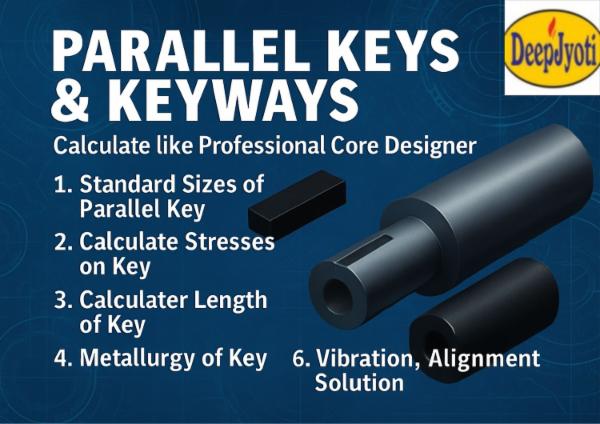There are no items in your cart
Add More
Add More
| Item Details | Price | ||
|---|---|---|---|
DeepJyoti: Engineer Your Expertise. Design, Calculate, Dominate.
Design Engineer must know calculation for length of parallel key to transmit power, Metallurgy of key, FOS in Key design. DBSE is based on calculation. Our Mentor Knowledge solves this.
DBSE: Distance Between Shaft Ends
(DBSE) – Detailed Explanation
The Distance Between Shaft Ends (DBSE) is a crucial mechanical dimension used in power transmission systems to ensure proper alignment and compatibility between rotating components such as motors, gearboxes, pumps, and couplings.
1. Definition & Importance
- DBSE is the axial distance between the outermost ends of two shafts that need to be connected.
- It ensures that couplings, belts, chains, or other connecting elements fit correctly without misalignment.
- Incorrect DBSE can lead to vibration, premature wear, and mechanical failure.
2. Where is DBSE Used?
DBSE is critical in applications such as:
✔ Electric Motors & Gearboxes – Ensures proper coupling alignment.
✔ Pumps & Compressors – Helps in selecting the right shaft adapter.
✔ Conveyors & Belt Drives – Determines belt/chain length.
✔ Industrial Machinery – Used in aligning spindles, reducers, and transmissions.
3. How to Measure DBSE
A. For a Single Shaft (Before Coupling)
- Measure from one shaft end to the other along the centerline.
- Example: A motor shaft may have a DBSE of 100mm if it extends 100mm from the motor housing.
B. For Two Shafts (Coupled System)
- Measure from the outermost end of the first shaft to the outermost end of the second shaft.
- Example: If a motor shaft sticks out 50mm and a pump shaft sticks out 60mm, the DBSE depends on the gap between them (e.g., 50mm + 60mm + 10mm gap = 120mm).
C. For Standardized Motors (IEC/NEMA)
- Many motors and gearboxes follow standardized DBSE dimensions for compatibility.
- IEC (Metric Motors): Defined in millimeters (e.g., 56mm, 132mm).
- NEMA (US Motors): Defined in inches (e.g., 5.25", 7.125").
4. DBSE vs. Other Shaft Dimensions
| Term | Definition |
|------|-----------|
| DBSE | Distance between the extreme ends of two shafts. |
| Shaft Length | Length of a single shaft from end to end. |
| Overhang (O/A Length) | Distance from the bearing to the shaft end. |
| Face-to-Face Distance | Distance between mounting faces (not shaft ends). |
5. Common Issues Due to Incorrect DBSE
❌ Misalignment → Causes vibration, bearing failure.
❌ Excessive Gap → Couplings may not engage properly.
❌ Too Short → Shafts may collide or overload bearings.
6. How to Ensure Correct DBSE
1. Check Manufacturer Specifications (motor/gearbox datasheets).
2. Use Adjustable Couplings (if exact DBSE is uncertain).
3. Follow Industry Standards (IEC, NEMA, AGMA).
4. Measure During Installation (use calipers or rulers).
Instructor: DeepJyoti-Product-DesignLanguage: English
Dominate Engineering Design: Master Parallel Keys & Keyways with DeepJyoti - Calculate Like a Pro, Outrank the Competition!
Description:
Unlock unparalleled precision in mechanical design! DeepJyoti presents the ultimate guide to Parallel Keys & Keyways. Master stress calculations, optimize key length, delve into metallurgy, and ensure peak safety factors. Gain expert insights into vibration and alignment solutions, all while adhering to rigorous industrial standards. Elevate your engineering prowess and calculate like a professional core designer. Dominate your projects and achieve superior power transmission with our comprehensive resources. This course covers the selection of parallel keys and keyways, as well as stress calculations related to these components. You will learn how to choose the appropriate parallel key and keyway for different applications and how to calculate the stress levels to ensure optimal performance.
Key Highlights:
What you will learn:
Learn live with top educators, chat with teachers and other attendees, and get your doubts cleared.
Our curriculum is designed by experts to make sure you get the best learning experience.
Stuck on something? Discuss it with your peers and the instructors in the inbuilt chat groups.
